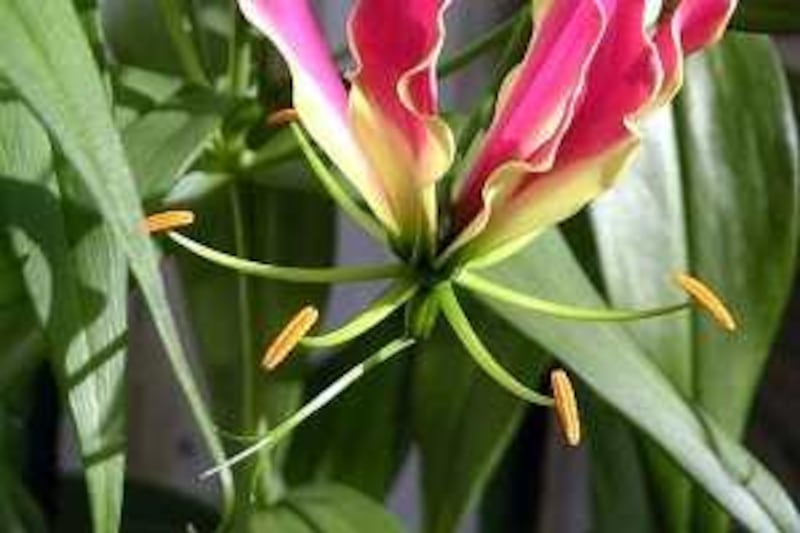HARARE // Zimbabwe's national flower, the flame lily, is facing possible extinction because of illegal harvesting and trade. Togara Makotose, 27, a flame lily poacher from Epworth, a slum east of Harare, said he knows that picking the flower and selling it is illegal, but that he can make a good living from it. He gets the flowers from forests in Dambakurimwa, 10km north of where he lives, and sells them for US$8 per bouquet on a roadside in the affluent suburb of Borrowdale, a lot of money in impoverished Zimbabwe.
"This is my business this time of the year," he said. "I sell to people who would be organising weddings and parties. It is a seasonal plant and it grows wild. It flowers from December and demand is high around Christmas. During the festive season I was earning up to $80 daily from selling it." He waves a floppy sample of the flower at passing cars. When someone shows an interest in purchasing the flowers, he runs off to a nearby bush where he keeps his stock hidden and brings back a bunch.
The flame lily, plentiful now amid the summer rains, is native to Zimbabwe and most of tropical Africa and parts of Asia. It was the national flower of Rhodesia, as Zimbabwe was known before independence from Britain in 1980, and has retained that special status. The flame lily is adapted to high summer rainfall and a dormant dry season, and flowers between December and March every year in Zimbabwe.
It can grow to about a metre in height, stands out in the wild because of its pinkish-red petals which resemble a flame or the head of a cockerel, hence its vernacular name, jongwe (cockerel in the local Shona language). The plant contains a substance called colchicine, which is dangerous to ingest. In Zimbabwe, the flower occurs mainly in the higher rainfall areas of Marondera, Hwedza, Rusape, Goromonzi and Domboshava - generally east of Harare. Roadside flower vendors are a common sight in these areas.
Environmentalists say, in addition to breaking the law by simply harvesting and selling the flame lily, poachers uproot the flower, which makes its regeneration impossible and its extinction a genuine possibility. Sheunesu Mupepereki, chairman of the statutory Environmental Management Authority board, described the harvesting of the special flower as "rampant". "It is our national flower," said Prof Mupepereki, a professor of soil science at the Harare-based University of Zimbabwe.
"So when it is harvested as rampantly as is the case now - sometimes with no chance of regeneration - we become concerned. Because of its beauty and monetary value that can be derived from it, the rate of its harvesting, if unchecked, might lead to its extinction." The flame lily is listed as a protected plant under the Parks and Wildlife Act, so unlicenced cultivation, harvesting and trade in it is illegal. The law also makes it an offence to destroy, possess, or exchange the flower. "No person shall sell any specially protected indigenous plant except in terms of a permit issued," Section 52 of the Parks and Wildlife Act reads in part.
"The authority [National Parks and Wildlife Management Authority], in concurrence with the ministry [of environment], may issue a permit to a cultivator of specially protected plants." The act further says people can buy the flame lily only from "an individual who is a [licenced] dealer in specially protected indigenous plants or unless one is a member of a recognised horticultural society and the sale is to a member of the same or any other recognised horticultural society".
Anyone who contravenes the act is liable to a fine and/or imprisonment up to six months. foreign.desk@thenational.ae





